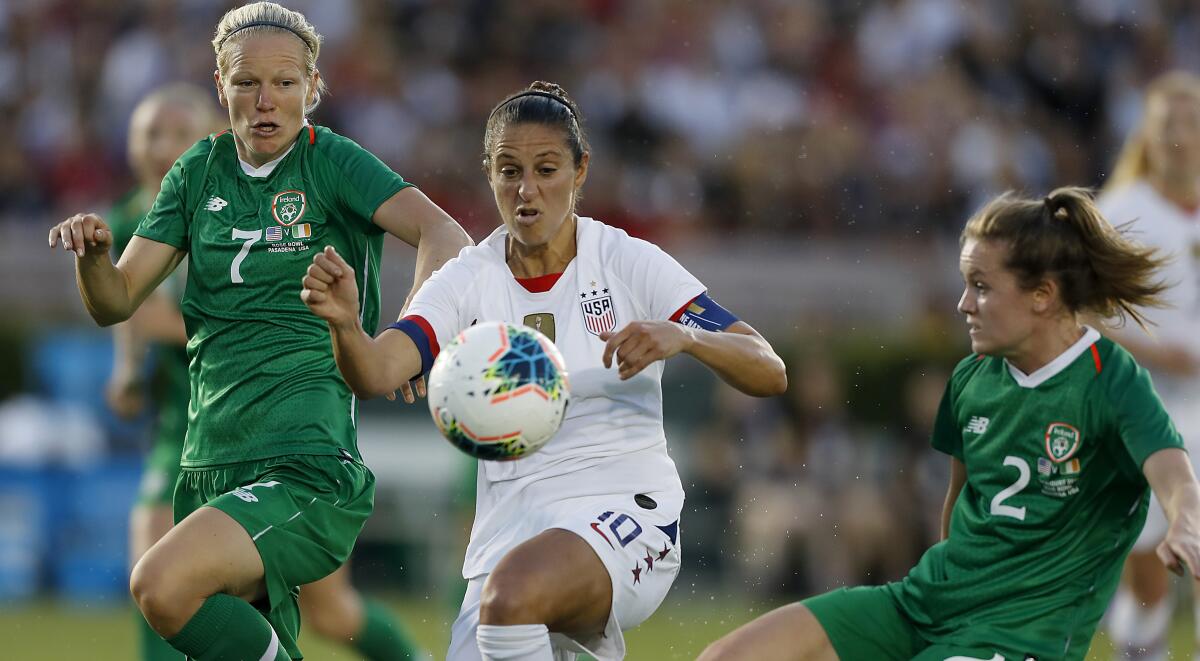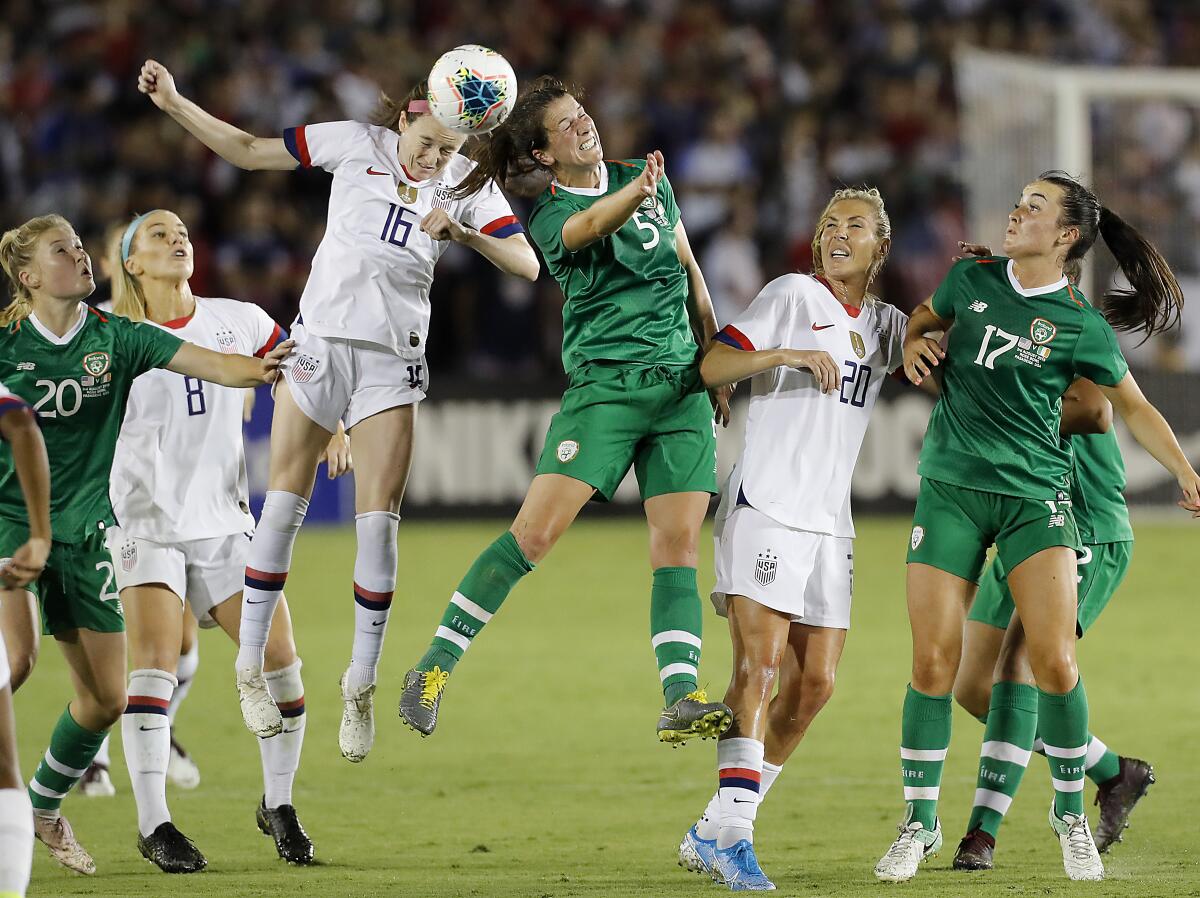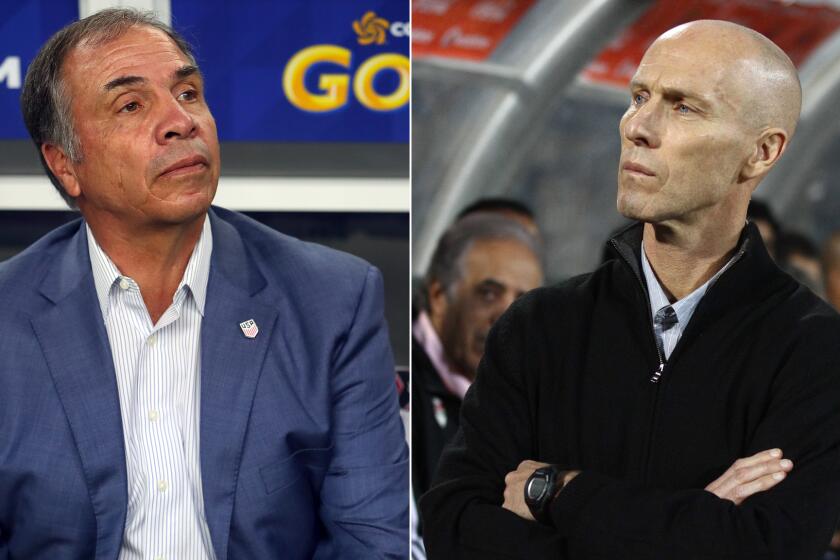Equal pay push reverberates with fans attending U.S. women’s soccer victory tour

- Share via
Fresh off winning a World Cup in France, the U.S. women’s national team opened its five-game Victory Tour, beating Ireland 3-0 on Saturday at the Rose Bowl, displaying the dominance that many fans are accustomed to seeing. Tobin Heath — a last-minute starter in place of Mallory Pugh — struck first, scoring on a header from a Christen Press pass in the 16th minute.
Lindsey Horan and Carli Lloyd also added first-half goals at the 31st and 41st minute, respectively.
But there was more on display than just soccer. It wasn’t about a swift victory over Ireland, it was a show of solidarity and support for everything the women’s national team represents and is fighting for.
“We are here because we followed the whole World Cup. We watched it together as a family. It’s nice to have the team out here to watch them live,” said Bakersfield resident Andy Stanley, who attended with his wife and daughter. “I think that the visibility of the team is a great show of the advancement of women in our country.”
On Saturday, old friends faced off in New England when Bob Bradley’s LAFC team, the best team in the MLS, faced Bruce Arena’s Revolution, which hasn’t lost since he took over as coach in May.
The team was not without controversies this summer. Controversy over celebrations arose after the first group game against Thailand, a 13-0 rout, and before it traveled to Paris, the team sued U.S. Soccer Federation for equal pay. Throughout their World Cup run, the women have become also synonymous with pay equality. Instead of the traditional “U-S-A” chants heard during national team games, the fans at the Rose Bowl shouted, “Equal Pay!”
The general consensus among fans is that the women deserve equal pay, but questions of what is equal and how to achieve equal pay leave many fans baffled. Long Beach residents Debbie Morris and her wife, Wendy Morris, are avid soccer fans, but they don’t believe equal pay can be easily achieved.

“I played soccer. I love soccer. Equal pay is good, but unfortunately unless we have the support of other women and people going to the games, I don’t see it happening,” Debbie Morris said. “There are steps to try to improve [pay], but it’s a matter of getting people to come out and watch it and having NWSL games on television.”
The message and sentiments about pay inequality have trickled down to the younger generation as well.
Little girls adorned in red, white, and blue T-shirts with the famous Megan Rapinoe open-arms pose have learned more about the pay inequality in the last month than most children their age.
I saw it on [television],” replied a 7-year-old named Paige. “They’re trying to get more money.”
“They’re suing because they are paying the men more than the women,” said an 8-year-old girl from Ventura, whose parents asked that she remain anonymous.
“Yes, it’s fair,” she replied when asked if they should be paid more.
If only it were that simple. The Wall Street Journal reported that the women’s team generated more revenue than the men’s team from the most recent three-year period. U.S. Soccer said it actually paid the women’s team $7.7 million more than the men’s team between 2010-2018.
U.S. defender Abby Dahlkemper found it encouraging to know young children understand the importance of fairness.
“I think that’s really cool and special,” she said. “I think that equal pay is kind of an issue outside of soccer, as well. I think it’s prevalent in all work places. I think that there’s this movement now that [women] are coming together and gaining power. I think that it’s really powerful and I think it’s special and hopefully we can see some changes.”
More to Read
Go beyond the scoreboard
Get the latest on L.A.'s teams in the daily Sports Report newsletter.
You may occasionally receive promotional content from the Los Angeles Times.








